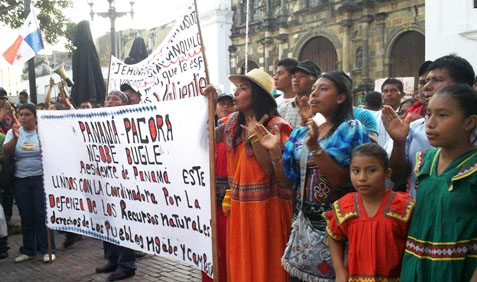
From Canada to the United States to Panama, and beyond, indigenous women are leading major campaigns to protect the purity and health of the rivers. In Panama, Ngäbe-Buglé women have been organizing for over a decade to shut down the Barro Blanco Hydroelectric Dam. Women like Clementina Pérez, Weni Bagama, and Silvia Carrera have led the charge not only to stop the dam and to insist on real and proper negotiations before changing the entire regional ecosystem but to think and act deeply and respectfully about development models based on mutuality, respect and sustainability.
Panama has five comarcas indígenas, or Indigenous administrative zones. Of the five, three are substantial and large enough to be fairly autonomous, on the order of a province or state. Of the three autonomous comarcas indígenas, the comarca Ngäbe-Buglé is the largest. After decades of Indigenous organizing and mobilizing, the comarca Ngäbe-Buglé was established in 1997. From its inception, the comarca Ngöbe-Buglé ran up against the national government’s model for national economic expansion, which relied heavily on mining and, more recently, big dams. The Barro Blanco dam project, begun in 2006, would seriously affect the Tabasará River, a mainstay of Ngäbe-Buglé economic and social life: “The Ngäbe’s way of life is threatened by the ongoing construction of the Barro Blanco dam. This dam would displace the Ngäbe by threatening to flood several homes, schools, and farms. The free-flowing Tabasará with its abundant fish and crustaceans would be converted into a pool of standing water, breeding bacteria, mosquitos and, ultimately, disease.”
Ngäbe and Buglé women decided that they had had enough. Life for women on the comarca has been hard. Rudimentary health care is barely accessible. The national government builds the odd clinic, but doesn’t staff it or provide materials. There are no ambulances, and besides the roads are perilous. For women, this has a particular impact: “Pregnant women had to walk as many as five hours to give birth and often ended up having to stop to have the baby before arriving to a health center or midwife’s house.” The women also know that poor roads means children can’t get to school, and so they are condemned to poverty. Meanwhile, the few good roads that do exist in the comarca serve the mines and the hydroelectric dams. It’s a familiar situation for Indigenous peoples around the world.
The Ngäbe and Buglé women saw the Barro Blanco dam is the signature of their marginalized, diminished and disrespected personhood, citizenship and humanity. And so they organized. They established a protest camp on the bank of the river and got to work. For twenty years, they watched as the national government voted in law after law that allowed for, and encouraged, direct foreign investment into Indigenous lands. During the same period, Indigenous peoples’ leadership was increasingly feminized, and in 2012, Silvia Carrera, a prominent anti-mining activist, became the first woman elected chief of the Ngöbe-Buglé.
For the past two decades, Ngäbe-Buglé women activists have been systematically assaulted. They have been imprisoned, beaten, raped and killed, and throughout they have continued to lead the movement for dignity and autonomy. They have watched entire villages swept away by the waters, and refused to accept that fate. They have faced down dogs and riot squads. Today, they are still on the move. They have stopped construction of the Barro Blanco Dam, temporarily, but they know that the violence will continue until violation of their land as part of national and regional development is finally rejected.
Silvia Carrera explained, “Look how they treat us. What do we have to defend ourselves? We don’t have anything; we have only words. We are defenseless. We don’t have weapons. We were attacked and it wasn’t just by land but by air too. Everything they do to us, to our land, to our companions who will not come back to life, hurts us. … The government says Good, Panama is growing its economy. Yet the economy is for a few bellaco [macho men]. But progress should be for the majority and for this we will go into the street, and from frontier to frontier, to protest … We are not violent. We just want to reclaim our rights and justice. Above all, we want to live in peace and tranquility.”
And the people respond, “No to the miners! No to the hydroelectric!” From North Dakota to the northwest of Panama, women water protectors are saying YES to the dignity of earth, of their people, of all people, of justice, peace and tranquility.
(Photo Credit: Telesur / ESCRIBANA / CONAMUIP)